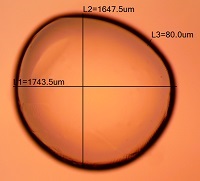 |
| The G-DCA microcapsule--Courtesy of Curtin University |
Researchers at Curtin University's Biotechnology and Drug Development Research Laboratory in Perth, Australia, are developing a microcapsule formulation that they say improves the drug delivery and absorption of diabetes drugs.
"Low drug absorption, which results in unnecessary add-on therapies and higher dose administration, and failure to restore bile acid disturbances in the gut are further limitations of current anti-diabetic drug therapies," said PhD candidate Armin Mooranian in an article by an Australian news service focused on science and technology.
The team mixed the common Type 2 diabetes drug gliclazide with deoxycholic acid (DCA) which is produced in the liver with the help of intestinal bacteria.
"Our approach was novel and unique in the use of bile acids (made in the liver), which have important functions in the body by lowering glucose levels, helping keep the gut healthy with friendly bacteria and assisting the immune system fight infections," Mooranian said in the article.
The team is conducting animal trials of the microcapsules with partners in Australia, as well as New Zealand, Canada and Europe.The primary investigator is professor Hani Al-Salami, founder of Curtin University's Biotechnology and Drug Development Research Laboratory.
The new formulation is dubbed G-DCA after its constituent components. It has passed tests of drug content, microencapsulation efficiency, stability and drug-content release, according to the article. It was also successfully tested at various temperatures and high humidity. Moreover, the formulation delivered gliclazide better than conventional ones, resulting in longer release time and better absorption.
More scientific details are described in a paper in the Journal of Microencapsulation.
There are similar diabetes drugs with unconventional delivery in the pipeline. Oramed's oral insulin candidate for early-stage diabetes is in Phase IIa for both Type 1 and Type 2 diabetes. And Intarcia's candidate, which is delivered subcutaneously via a matchstick-sized osmotic pump, is in Phase III trials according to the company website.
- read the article
- here's the study abstract
Related Articles
BD launches AutoShield Duo pen for diabetics
Oramed recruits patients for Type 1 diabetes oral insulin trial
Intarcia enrolls PhIII glucose control study for Type 2 diabetes
Amylin gets FDA OK for weekly diabetes drug Bydureon